Search the Special Collections and Archives Portal
Search Results
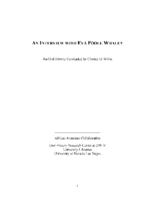
Transcript of interview with Eva Whaley conducted by Claytee White, May 13, 2013
Date
Archival Collection
Description
Whaley moved to Las Vegas from rural Arkansas in the early 1960s. She and her husband owned restaurants
Text
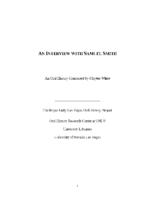
Transcript of interview in two sessions with Samuel Smith conducted by Claytee White, June 17, 2011, and June 22, 2011
Date
Archival Collection
Description
Transcript from interviews with Samuel Smith by Claytee White, June 17, 2011, and June 22, 2011. Smith was a police officer in New York and moved to Las Vegas in 1978, where he became a fire inspector with the Las Vegas Fire Department. In this interview he discusses issues facing the Westside including racism, business development and education.
Text
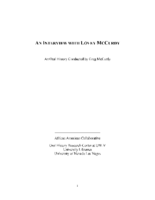
Transcript of interview with Lovey M. McCurdy conducted by Greg McCurdy, March 19, 1981
Date
Archival Collection
Description
Transcript of interview with Lovey McCurdy by Greg McCurdy, March 19, 1981. Mrs. McCurdy discusses her memories of Las Vegas when she arrived in 1951, as well as her employment and family.
Text

Transcript of interview with Ruby Amie-Pilot by Barbara Tabach and Claytee White, August 7, 2012
Date
Archival Collection
Description
Ruby Amie-Pilot moved to Las Vegas in 1952. She worked at the Desert Inn in the kitchen, was the first African American full time sales person at Sears; she also worked as a window dresser with Hazel Gay, and later owned travel agency with Esther Langston. In the interview, Ruby discusses moving to the Westside, Jackson street and housing developments, education, and her experiences with local leaders.
Text
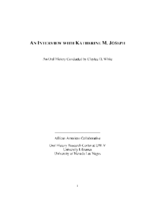
Transcript from interviews with Katherine M. Joseph by Claytee White, October 25, 2004 and September 5, 2007
Date
Archival Collection
Description
Two-session interview with Katherine M. Joseph by Claytee White, October 25, 2004, and September 5, 2007. Joseph is a community activist and was a co-worker of Lubertha Johnson, and involved with Operation Independence. In the interview, Johnson discusses her family, her employment, and life on the Westside.
Text
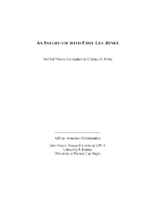
Transcript from interview with Essie Lee Jones by Claytee White, June 5, 1996
Date
Archival Collection
Description
Essie Lee Jones moved from the Tallulah, Louisiana, area to Las Vegas in 1969. In the interview, Jones discusses her employment in various positions such as maid, waitress, and casino porter at the Stardust, Frontier, and Aladdin Hotel/Casinos.
Text

Transcript of interview with Hannah Brown by Claytee D. White, September 27, 2012
Date
Archival Collection
Description
Growing up in the Westside community, worked in the Sight N Sound Record Store. Brown spoke of entertainers in the neighborhood and their influence on community children. Second portion of interview filmed at PBS.
Text
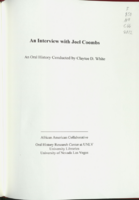
Transcript of interview with Joel Coombs by Claytee D. White, February 22, 2014
Date
Archival Collection
Description
Joel Coombs was raised in an interracial upper middle class family. Born in Newport News, Virginia, his parents relocated and separated when he was young. Joel's white father went on to marry a black woman by the name of Delores. Many of Joel's friends thought that Delores was just hired help, as coming from an interracial home in Las Vegas in the 1970s was considered extremely rare. Joel recalls having to tell his peers on more than one occasion that Delores was his mom and not his maid. His fondest family memories include rock collecting and going to the gun range. Joel became a cheerleader and ran track in high school and college. He recalls attending Valley High School amidst racial tensions, racism, and prejudice. His recollections concerning high school lockdowns and race riots reveal the underlying social issues that once plagued Las Vegas, Nevada. Another major social problem that negatively impacted the lives of Joel's peers was drug abuse, as drugs were easily available at Valley High School and at Bishop Gorman in the 1970s. As an interracial couple Joel's parents were at the forefront of the Civil Rights movement. He recalls participating in the protests as a child and landing on the front page of The Post. In regards to jobs, prior to building and designing roofs and floors at Truss Plant, Joel worked as a jeweler and as a land surveyor. Growing up in an interracial home in Las Vegas helped to shape him into the hardworking, socially aware, and innovative man he is today.
Text

Transcript of interview with Q.B Bush by Claytee D. White, May 15, 2007
Date
Archival Collection
Description
Q.B. was one of the first black dealers on the LV Strip. Talks of the Economic Opportunity Board, the LV black experience and shared photo collection.
Text

Transcript of interview with Eunice Claxton by Claytee White, June 4, 2015
Date
Archival Collection
Description
Lived in LV and Reno, attended Westside School, worked as shield in El Morocco, and memories of Jackson Street life. Donated small collection containing photographs; memorial programs containing some history of COGIC; and two bulletins of regional COGIC convocations, one at Nucleus Plaza; and the Gully Family History.
Text
